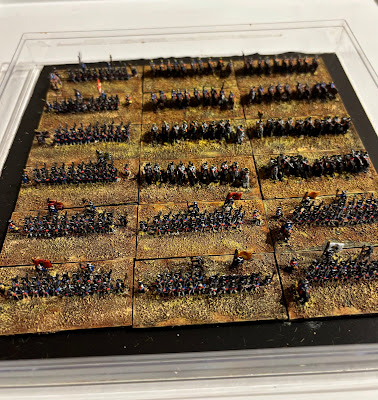Now the soldiers of the assorted states of the Holy Roman Empire have been recruited, along with their neighbours from the United Provinces, the task of organising them into regiments, clothing and equipping them has begun.
First step was to undercoat them. This was completed by Saturday. Step two was to turn all these faceless warriors into, warriors that had faces. So flesh was dabbed on them. All 1400. This was completed on Saturday whilst listening to the build up, and first half of Grimsby's FA Cup match. I missed the second half to go for a swim, and I'm flaming glad I did. The best that can be said is 'we can concentrate on the League now'.
I digress. Now step three was to break the metaphorical elephant down into more manageable pieces. I always do batch painting (hence steps 1 and 2) but doing 1100+ infantry, colour by colour, is a bit daunting. I have therefore broken them down to what some games call 'factions'. As I'd been thinking of Minden for a long time, I decided to crack on with the Hessens and Brunswickers. Next task was to identify the uniform colours, for which I leant on Kronoskaf. Sufficient figures were pulled out of the stocks to make up 7 units of musketeers, 2 of grenadiers, 1 hussars (combining Hessen and Brunswick regiments) and 1 of dragoons. I already have a unit of Hessian Horse finished from a month or so ago. I'll do a unit of Jäger later. 1 regiment of infantry (1/2 a game unit) is going to be dressed in late war style, in fusilier mitres because I have some in the spares box, and for a bit of variety.
 |
| Hessian Horse (regiments Prinz Wilhelm and Pruschenk), before the bases were finished. |
The infantry are all blue-coated (I've gone dark for the Hessens and mid-blue for the Brunswickers, just for variety and ease of identification), the dragoons are sky blue (like the Prussians). Rather boring in itself, but amongst the usual red cuffs and turn backs, there is yellow, white and even orange to lift the gloom. The hussars are also blue, but they just look more splendid, at least in the pictures:
Having organised all that, I finally got the various shades of blue paint out and set to work. The German auxiliaries all have coats now. They're now waiting for the commissariat of His Britannic Majesty to provide the rest of the clothing and weaponry. Can I finish painting by the weekend?
Whilst I've been doing all this, apart from football, I've been listening to the
Empire podcast with William Dalrymple and Anita Anand. Specifically the series on the East India Company, and the Great Game. Having gone through all the early days of the EIC and its rise to power over much of India, I've been through the First Afghan War and now on to the Crimean War. The guest on the latter is Orlando Figes author of (what I thought) was an excellent introductory tome on the CW. Very, very entertaining and informative. All spookily current too.
Update
I have finished painting the Brunswick line infantry contingent, including the flags. Plus on the rest I've done all the white breeches, swords, musket barrels/bayonets, drums, mitre fronts and metal on the flags, pontoons etc. I also had to go back and do some of the coat backs and faces that I'd missed. Just over 3 hours work. Effectively I'm only 2 packs down of the 30 that I bought. Gulp!
It's the cross belts and the hat lace that takes the time. But tis' these things that make them look like 18th century soldiers, so it's worth it.
Oh, and if you came here looking for the Big Push, the band, here is something for you:
A bientôt mes amis!








